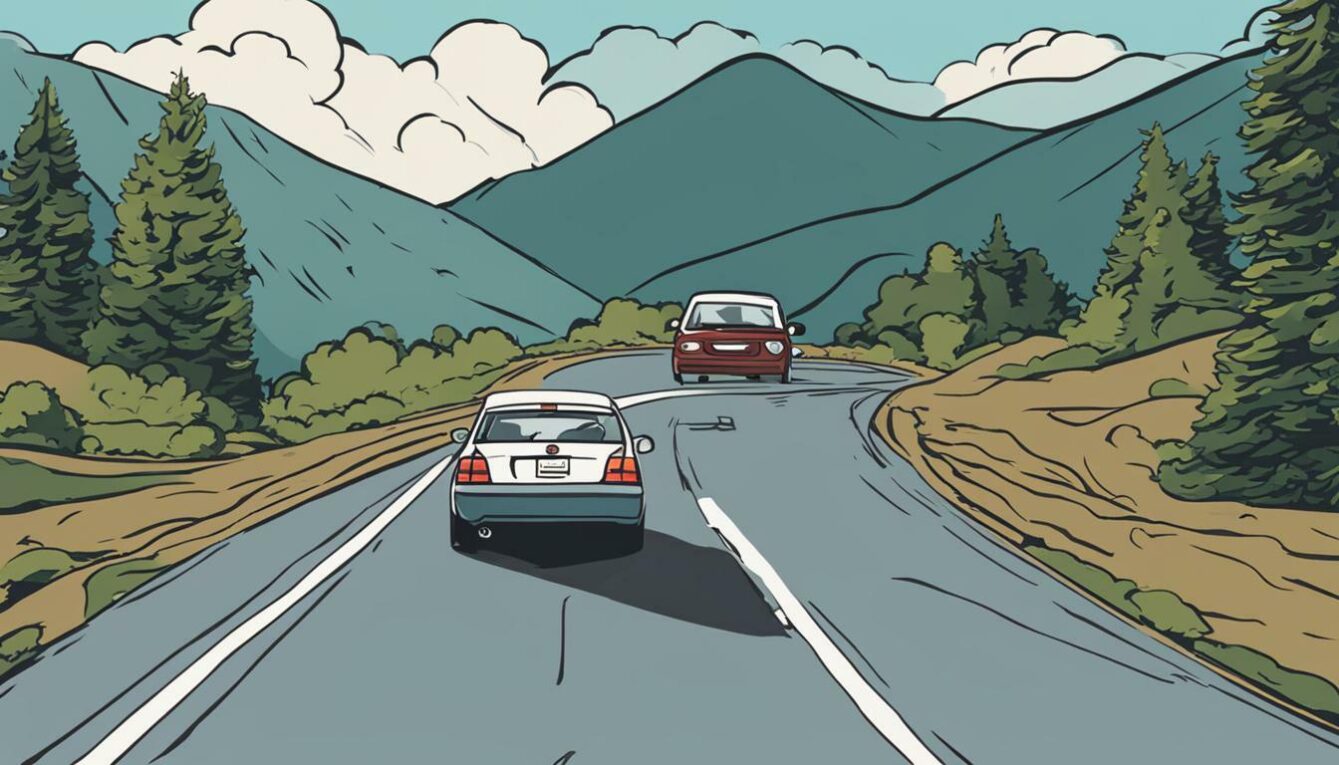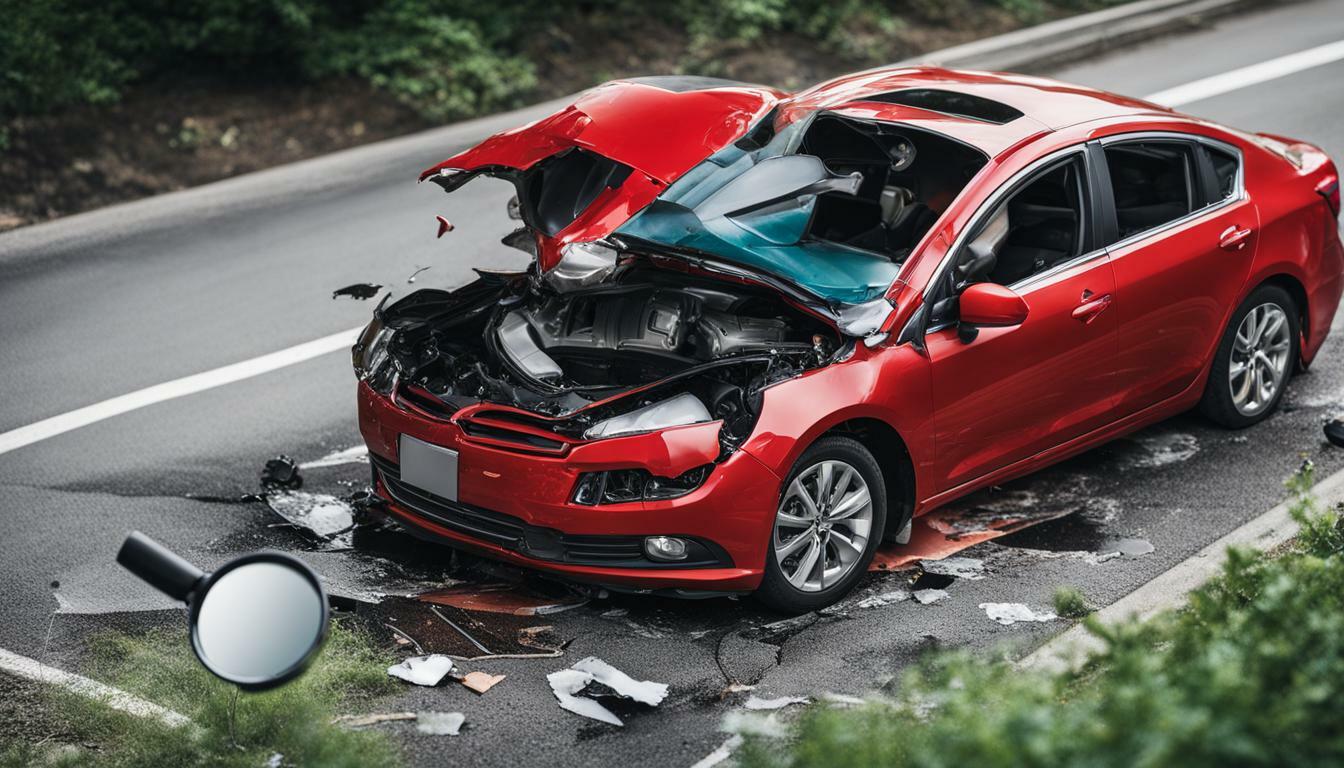Car insurance can be complex, but one important aspect to understand is collision coverage. This type of auto insurance provides coverage for the cost of repairing or replacing your vehicle in the event of a collision with another vehicle or object. While collision coverage is typically optional, it may be required by your lender if you are financing or leasing your car.
It’s important to note that collision coverage only applies to damage to your own vehicle and does not cover damage to other vehicles or objects, or bodily injuries. It differs from comprehensive coverage, which covers damage to your vehicle that is not the result of a collision, such as theft, vandalism, and natural disasters.
When considering collision coverage, you may have the option to select a higher deductible, which can help reduce the cost of the coverage. Additionally, it may not be necessary to purchase collision or comprehensive coverage for an older car.
Key Takeaways:
- Collision coverage is a type of auto insurance that covers the cost of repairing or replacing your vehicle in the event of a collision with another vehicle or object.
- It is typically optional coverage, but may be required by your lender if you are financing or leasing your car.
- Collision coverage only applies to damage to your own vehicle and does not cover damage to other vehicles or objects, or bodily injuries.
- Comprehensive coverage, on the other hand, covers damage to your vehicle that is not the result of a collision, such as theft, vandalism, and natural disasters.
- The cost of collision coverage can be reduced by selecting a higher deductible.
- It may not be necessary to purchase collision or comprehensive coverage for an older car.
Collision Coverage vs. Comprehensive Coverage
When it comes to car insurance, it’s important to distinguish between collision coverage and comprehensive coverage. Collision coverage specifically protects you in the event of a collision with another vehicle or object, covering the cost of repairing or replacing your own vehicle. On the other hand, comprehensive coverage provides protection for damage to your vehicle that is not caused by a collision, such as theft, vandalism, or natural disasters.
Collision coverage is typically optional, although your lender may require it if you are financing or leasing your car. Comprehensive coverage, like collision coverage, is also optional but can provide added peace of mind and financial protection. It is important to carefully consider your individual needs and circumstances when deciding whether to purchase collision or comprehensive coverage.
While collision coverage only applies to damage to your own vehicle, comprehensive coverage extends beyond collisions to cover a wider range of incidents. This may include damage from fire, flooding, falling objects, or even hitting an animal. It’s worth noting that collision coverage does not cover damage to other vehicles or objects, nor does it provide coverage for bodily injuries sustained in an accident.
Factors to Consider and Tips for Collision Coverage
When evaluating whether to purchase collision coverage, there are several factors to consider. One important factor is your car’s value. If your car is older and has a lower value, the cost of collision coverage may not be worth it. It may be more cost-effective to simply repair or replace the vehicle out-of-pocket if an accident occurs.
Another key consideration is the deductible. A higher deductible means you will have to pay more out-of-pocket before the insurance coverage kicks in, but it can also lead to lower monthly premiums. Assess your financial situation and weigh the potential savings against the risk of having to pay a higher deductible in the event of an accident.
In conclusion, understanding the differences between collision coverage and comprehensive coverage is essential when selecting car insurance. Collision coverage protects against damage caused by collisions with other vehicles or objects, while comprehensive coverage extends the protection to a wider range of incidents. By carefully considering your needs, vehicle value, and deductible options, you can make an informed decision that provides the right level of coverage and financial protection for your unique circumstances.
| Collision Coverage | Comprehensive Coverage |
|---|---|
| Protection for damage caused by collisions | Protection for non-collision incidents such as theft or natural disasters |
| Covers the cost of repairing or replacing your own vehicle | Covers the cost of repairing or replacing your vehicle |
| Does not cover damage to other vehicles or objects | Does not cover damage to other vehicles or objects |
| Optional coverage, may be required by lender | Optional coverage |
| Cost can be reduced by selecting a higher deductible | Cost can be reduced by selecting a higher deductible |
What Does Collision Coverage Cover?
Understanding the extent of coverage provided by collision coverage is key for car owners. This type of auto insurance is specifically designed to cover the cost of repairing or replacing your vehicle in the event of a collision with another vehicle or object. It provides peace of mind knowing that you are financially protected if your car sustains damage in an accident.
However, it’s important to note that collision coverage only applies to damage to your own vehicle. It does not cover damage to other vehicles or objects, or bodily injuries. For example, if you collide with another car and both vehicles sustain damage, each driver’s collision coverage would cover the repairs to their own vehicle, but not the other driver’s vehicle. Similarly, if your car collides with a fence or a tree, collision coverage would cover the cost of repairing the damage to your car, but not the fence or tree.
Here is a simplified breakdown of what collision coverage typically covers:
| Covered | Not Covered |
|---|---|
| Damage to your vehicle from a collision with another vehicle | Damage to other vehicles involved in the collision |
| Damage to your vehicle from a collision with an object (such as a fence or a tree) | Damage to the object |
| Damage to your vehicle from a single-vehicle accident, such as hitting a pothole or rolling over | Bodily injuries or medical expenses resulting from the collision |
It’s essential to review your policy documents or consult with your insurance provider to understand the specific terms and conditions of your collision coverage.
Factors to Consider and Tips for Collision Coverage
Before making a decision on collision coverage, it’s important to consider several factors and keep these tips in mind. One of the most significant factors to consider is your deductible. The deductible is the amount of money you will have to pay out of pocket before your insurance coverage kicks in. Choosing a higher deductible can lower your premium, but it also means you will be responsible for a larger portion of the repair or replacement costs in the event of a collision. It’s important to evaluate your financial situation and determine what deductible amount you are comfortable with.
Another factor to consider is the value of your car. If you have a newer or more expensive vehicle, collision coverage may be essential to protect your investment. On the other hand, if you have an older car with a lower value, the cost of collision coverage may not outweigh the potential benefits. In this case, you may choose to forgo collision coverage and rely on your savings to cover any repair or replacement costs.
Additionally, it’s worth noting that collision coverage is typically required by your lender if you are financing or leasing your car. Failure to maintain this coverage could result in a breach of your loan or lease agreement. Therefore, if you fall into this category, collision coverage becomes a necessity rather than an option.
Finally, it’s a good idea to review your overall auto insurance needs and consider adding other types of coverage, such as comprehensive coverage, to ensure you have adequate protection. Comprehensive coverage can offer additional peace of mind by protecting against non-collision related damages, such as theft or vandalism.
Summary:
- Consider your deductible amount and choose one that aligns with your financial situation.
- Evaluate the value of your car and decide if collision coverage is necessary based on its age and worth.
- Be aware that collision coverage may be required by your lender for financed or leased vehicles.
- Review your overall insurance needs and consider adding comprehensive coverage for more extensive protection.
| Factors to Consider | Tips for Collision Coverage |
|---|---|
| Higher deductible can lower premium | Evaluate your financial situation and choose a deductible amount accordingly |
| Newer or more expensive vehicle | Consider collision coverage to protect your investment |
| Older car with lower value | Weigh the cost of collision coverage against potential benefits |
| Financing or leasing your car | Collision coverage may be required by your lender |
| Review overall insurance needs | Add comprehensive coverage for additional protection |
In Conclusion
Understanding collision coverage is essential for making informed decisions when it comes to car insurance. Collision coverage is a type of auto insurance that covers the cost of repairing or replacing your vehicle in the event of a collision with another vehicle or object. It is typically optional coverage, but may be required by your lender if you are financing or leasing your car.
Compared to comprehensive coverage, which covers damage to your vehicle that is not the result of a collision, collision coverage only applies to damage to your own vehicle. It does not cover damage to other vehicles or objects, or bodily injuries. Therefore, it is important to carefully consider your needs and the value of your car when deciding whether collision coverage is necessary.
When purchasing collision coverage, one factor to consider is the deductible. The deductible is the amount you must pay out of pocket before your insurance coverage kicks in. By selecting a higher deductible, you can lower the cost of collision coverage. However, keep in mind that you will need to pay this deductible in the event of a collision before your insurance company will cover the remaining expenses.
It’s also worth noting that collision or comprehensive coverage may not be necessary for older cars. If the value of your car is low, it may be more cost-effective to forgo collision coverage and rely on personal savings to cover any repairs or replacement costs that may arise.
FAQ
What is collision coverage?
Collision coverage is a type of auto insurance that covers the cost of repairing or replacing your vehicle in the event of a collision with another vehicle or object.
Is collision coverage mandatory?
Collision coverage is typically optional, but it may be required by your lender if you are financing or leasing your car.
How does collision coverage differ from comprehensive coverage?
Collision coverage only applies to damage to your own vehicle caused by a collision, while comprehensive coverage covers damage to your vehicle that is not the result of a collision, such as theft, vandalism, and natural disasters.
Does collision coverage cover damage to other vehicles or objects?
No, collision coverage only covers damage to your own vehicle. It does not cover damage to other vehicles or objects, or bodily injuries.
Can I reduce the cost of collision coverage?
Yes, you can reduce the cost of collision coverage by selecting a higher deductible. However, it’s important to consider the financial impact of a higher deductible in the event of a collision.
Do I need collision or comprehensive coverage for an older car?
Depending on the value of your older car, it may not be necessary to purchase collision or comprehensive coverage. It’s important to assess the cost of coverage compared to the potential repair or replacement costs of your vehicle.



